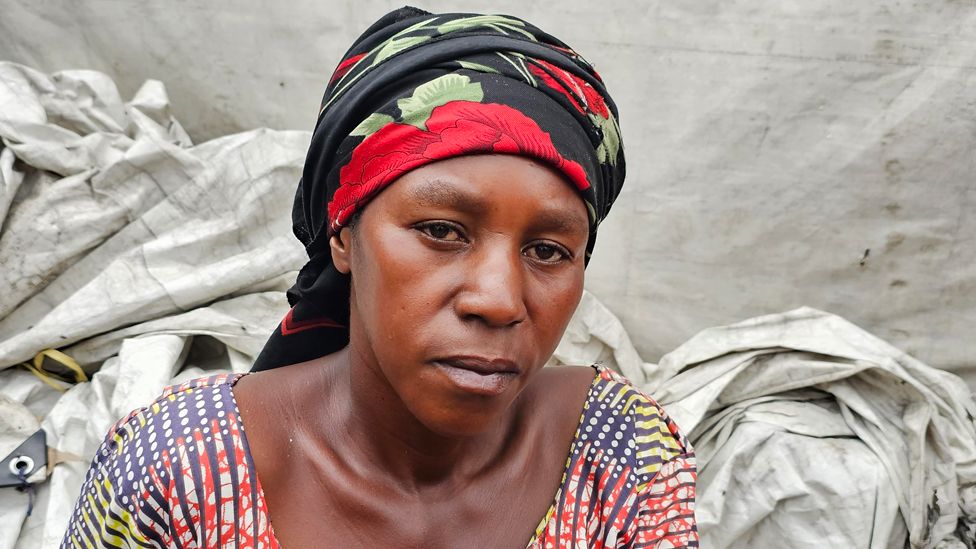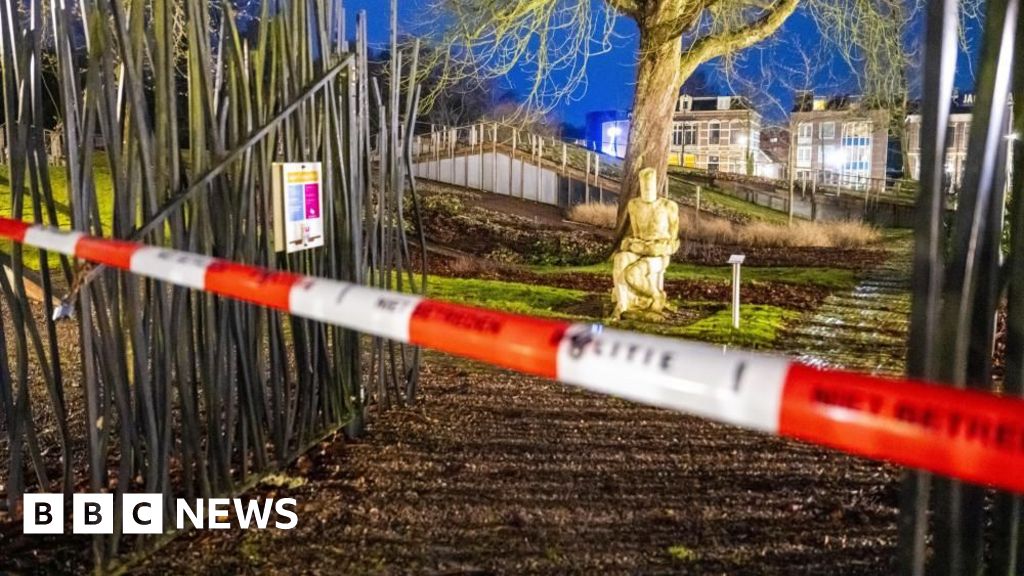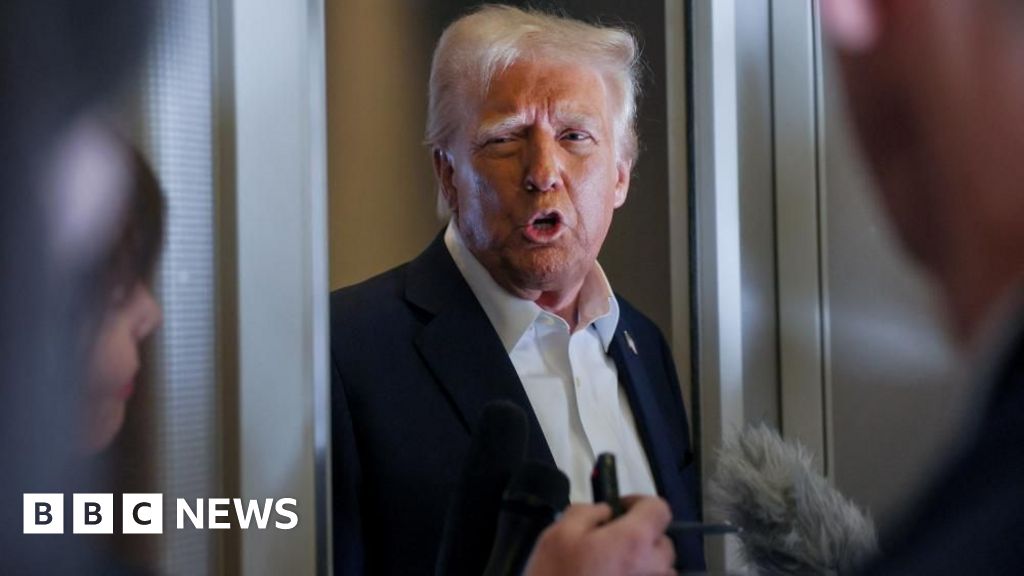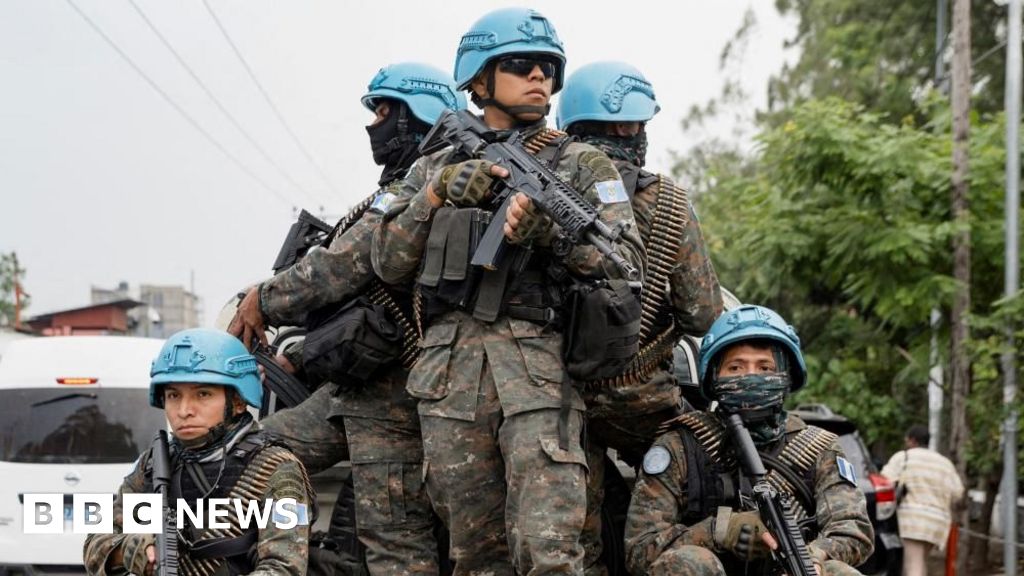ARTICLE AD BOX

By Mercy Juma in Goma & Samba Cyuzuzo in Nairobi
BBC News
After heavily armed rebels surrounded her small village in eastern Democratic Republic Congo, Musa Bi walked for seven days with six young children until she reached a UN-run refugee camp.
The 42-year-old is filled with worry, with no idea of the fate of her husband and two other children, as the family was separated in the chaos that followed the advance by the M23 rebels.
She has little thought for the 20 December presidential election - and while the conflict taking place around her may be dominating the campaign, there will no voting in several areas of the North Kivu province where she lives because of the unrest.
"M23 came. They were fighting with our [government] soldiers. We started running and those who could not run away, they were killed," she tells the BBC.
Fortunate to survive, Mrs Bi and her children slept in other villages until they reached the Bushagala camp only to be once more spending the nights out in the open, often in the rain.
When the BBC met them, they had been at the camp at the base of the Mount Nyiragongo volcano for six days, waiting for the UN refugee agency to register them so they get a tent - and food rations.
But the agency is so overwhelmed by the influx of those fleeing - 700 to 1,000 each day - that Mrs Bi is patiently waiting her turn, while relying on those already registered to share their food - normally made of sorghum and millet flour - with her and her little ones.
The UN estimates that nearly seven million people are internally displaced in DR Congo, the highest number on record.
Yet at Mrs Bi's village near the town of Masisi, her family was self-sufficient, growing food on their nearby farm - until they were driven out by M23, who are on the offensive again as a regional ceasefire initiative flounders.
The fighters, initially Congolese army deserters, accuse the government of marginalising the country's ethnic Tutsi minority and refusing to negotiate with them. They regard the verdant hills around Masisi as their true homeland.
Image source, AFP
Image caption,President Tshisekedi held an election rally over the weekend in Goma, where several anti-UN protests have been held
President Félix Tshisekedi, who is seeking a second five-year term, has been whipping up nationalist fervour by casting the rebels as a front for what he calls the "expansionist aims" of neighbouring Rwanda - and going as far as to compare its president to Germany's World War Two leader.
"I'm going to address Rwandan President Paul Kagame and tell him this: since he wanted to behave like Adolf Hitler by having expansionist aims, I promise he will end up like Adolf Hitler," Mr Tshisekedi said at an election rally in the east on Friday.
"However, he [has] met his match, someone who is determined to stop him and protect his country."
Mr Kagame has not responded, but a Rwandan government spokeswoman said such comments were "a loud and clear threat".
Image source, AFP
Image caption,M23 rebels, made up of some Congolese army deserters, are well equipped and say they represent the country's Tutsi minority
Rwanda has always denied backing the M23, but for many years has criticised the Congolese authorities for failing to disarm ethnic Hutu rebels - some of whom are linked to the Rwandan genocide in 1994.
Hundreds of militias proliferate in the mineral-rich region, where the military has failed to get a grip on security for the last three decades. All armed groups eye the profits as the metals mined end up in products such as mobile phones, cars, planes and jewellery.
In a further sign of nationalist fervour ahead of the election, Mr Tshisekedi has booted out an East African peacekeeping force - about a year after he welcomed it.
Earlier he ordered the withdrawal of the UN mission, known by its acronym Monusco, which has deployed more than 17,000 personnel, including 12,000 soldiers.
This does not surprise the commander of the UN troops, who acknowledges that they have failed to protect people like Mrs Bi from the advancing rebels.
"When people say Monusco was not doing their job sometimes, they are not wrong, we must accept that," says Lieutenant General Otávio Rodrigues de Miranda Filho of Brazil.
"The biggest challenge when I arrived here was to change the mindset of my troops. To motivate them and to make them understand that we have to be much more proactive and effective. Otherwise we lose the confidence of the population."
The UN withdrawal from eastern DR Congo could take years
Mr Tshisekedi is frustrated that neither force has taken a more robust approach to the M23, which is now only around 35km (20 miles) from Goma, the main city in the east with a population of about one million, over which Mt Nyiragongo looms.
This has raised the prospect of Goma falling to the rebels, just as it did briefly a decade ago. This gave way to a regional peace deal and the formation of a UN intervention brigade, made up of troops from the Southern African Development Community (Sadc), to bring the M23 to heel and disarm them.
The fighters eventually moved into camps, mainly in Uganda. They began regrouping two years ago at the foot of the mountains that stretch into Rwanda and Uganda - world famous for their gorillas and volcanoes - after complaints that the deal was not being honoured.
The fall of Mrs Bi's village - and the nearby town of Masisi - shows the renewed strength of the rebels.
With the DR Congo army in no position to fight them on its own, Mr Tshisekedi sees Sadc as his best bet, and has asked the regional group for help, given their soldiers' previous success.
The 16-member bloc - which includes South Africa, Tanzania and Angola - has agreed to send troops as part of a separate tougher force, though details are sketchy and it is unclear when it will arrive.
Mr Tshisekedi's decision to order the UN force to withdraw follows several big protests against it in Goma over its failure to beat back the rebels.
But some people the BBC spoke to said their withdrawal would leave them with no protection at all.
"Any time the rebels attack our villages and farms, it is the Monusco bases where we run to, for protection," says Elizabeth Ssebazungu from the Shasha camp about 30km west of Goma.
However, their exit will not be immediate and will take place in phases, possibly over several years.
In January, Pakistani troops will start pulling out of South Kivu province, something that should take four months.
"There is no established time for the second and third phase, until now. The government asked us to keep the timelines open," Gen Otávio says.
Between 700 and 1,000 flee to Bushagala camp each day
This is something many local people do not realise, especially as campaigning politicians riding the wave of anti-UN sentiment suggest it is imminent.
For Mrs Bi, it all feels piecemeal, while their plight continues to be ignored - despite election promises.
Her view is echoed by other refugees at Bushagala camp, including Uzima Sadro, who recently lost his farm to M23 rebels.
"Our struggles are not new. They are the same, just worse," he says.
"The politicians really do not care about us and have failed to bring peace, which is what we want."

 1 year ago
16
1 year ago
16









 English (US) ·
English (US) ·